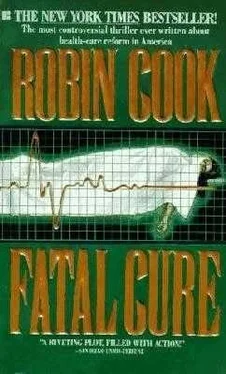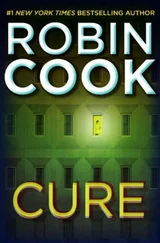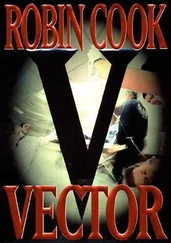Collette, Traynor's secretary, came into the room and placed a business card on the desk blotter in front of Traynor. At that moment Ned was carrying on about Bartlet losing its charm. Traynor picked up the card. It read: "Phil Calhoun, Private Investigation, Satisfaction Guaranteed."
Traynor covered the mouthpiece and whispered: "Who the hell is Phil Calhoun?"
Collette shrugged. "I've never seen him before, but he says he knows you. Anyway, he's waiting outside. I've got to run over to the post office."
Traynor waved goodbye to his secretary and then put down the business card. Meanwhile, Ned was still lamenting the recent changes in Bartlet, especially the condominium development near the interstate.
"Look, Ned, I've got to run," Traynor interrupted. "I really hope you give this hospital parking garage some thought. I know that Wiggins has been bad-mouthing it, but it's important for the hospital. And frankly, I need all the votes I can get."
Traynor hung up the phone with disgust. He had trouble understanding the short-sightedness of most of the Selectmen. None of them seemed to appreciate the economic significance of the hospital, and that made his job as chairman of the hospital board that much more difficult.
Traynor peered into the outer office to get a glimpse of the PI he supposedly knew. Flipping through one of the hospital quarterly reports was a big man in a black and white checkered shirt. Traynor thought he looked vaguely familiar, but he couldn't place him.
Traynor invited Calhoun inside. While they shook hands, Traynor scoured his memory, but he still drew a blank. He motioned toward a chair. The two men sat down.
It wasn't until Calhoun mentioned that he'd been a state policeman that it came to Traynor. "I remember," he said. "You used to be friends with Harley Strombell's brother."
Calhoun nodded and complimented Traynor on his memory.
"Never forget a face," Traynor boasted.
"I wanted to ask you a few questions about Dr. Hodges," Calhoun said, getting to the point.
Traynor nervously fingered the gavel he used for hospital board meetings. He didn't like answering questions about Hodges, yet he was afraid not to. He didn't want to make it an issue. He wished this whole Hodges mess would go away.
"Is your interest personal or professional?" Traynor asked.
"Combination," Calhoun said.
"Have you been retained?" Traynor asked.
"You might say so," Calhoun said.
"By whom?"
"I'm not at liberty to say," Calhoun said. "As a lawyer, I'm sure you understand."
"If you expect me to be cooperative," Traynor said, "then you'll have to be a bit more open yourself."
Calhoun took out his Antonio y Cleopatras and asked if he could smoke. Traynor nodded. Calhoun offered one to Traynor, but Traynor declined. Calhoun took his time lighting up. He blew smoke up at the ceiling, and then spoke: "The family is interested in finding out who was responsible for the doctor's brutal murder."
"That's understandable," Traynor said. "Can I have your word that whatever I say remains discreet?"
"Absolutely," Calhoun said.
"Okay, what do you want to ask me?"
"I'm making a list of people who disliked Hodges," Calhoun said. "Do you have anyone to put on my list?"
"Half the town," Traynor said with a short laugh. "But I don't feel comfortable giving names."
"I understand you saw Hodges the night of his murder," Calhoun said.
"Hodges burst in on a meeting we were having at the hospital," Traynor said. "It was an unpleasant habit of his that he indulged all too frequently."
"I understand Hodges was angry," Calhoun said.
"Where did you hear that?" Traynor asked.
"I've been speaking to a number of people in town," Calhoun said.
"Hodges was angry all the time," Traynor said. "He was chronically unhappy with the way we manage the hospital. You see, Dr. Hodges had a proprietary feeling about the institution. He was also dated in his thinking. He was an old-school 'doc' who ran the hospital when it was a cost-plus situation. He had no feeling for the new environment of managed care and managed competition. He just didn't understand."
"I don't think I know too much about that, either," Calhoun admitted.
"You'd better learn," Traynor warned. "Because it's here. What kind of health plan are you under?"
"CMV," Calhoun said.
"There you go," Traynor said. "Managed care. You're already part of it and you don't even know it."
"I understand when Dr. Hodges burst into your hospital meeting he had some hospital charts with him."
"Parts of charts," Traynor corrected. "But I didn't get a look at them. I was planning on having lunch with him the following day to discuss whatever was on his mind. It undoubtedly concerned some of his former patients. He was always complaining about his former patients not getting VIP treatment. Frankly, he was a pain in the ass."
"Did Dr. Hodges bother the new hospital administrator, Helen Beaton?" Calhoun asked.
"Oh, God, yes!" Traynor said. "Hodges would think nothing of barging into her office any time of the day. Helen Beaton was probably the person who suffered from Hodges' barrages the most. After all, she had his old position. And who knew how to do it better than himself?"
"I understand that you ran into Hodges a second time that night he burst in on your meeting," Calhoun said.
"Unfortunately," Traynor said. "At the inn. After most hospital meetings, we go to the inn. That night Hodges was there drinking as usual and as belligerent as usual."
"And he had unpleasant words with Robertson?" Calhoun asked.
"He sure did," Traynor said.
"And with Sherwood?" Calhoun said.
"Who have you been talking with?" Traynor asked.
"Just a handful of townsfolk," Calhoun said. "I understand Dr. Cantor said some unflattering things about Hodges too."
"I can't remember," Traynor said. "But Cantor hadn't liked Hodges for years."
"How come?" Calhoun asked.
"Hodges took over radiology and pathology for the hospital," Traynor said. "He wanted the hospital to accrue the windfall profits those departments generated from equipment the hospital owned."
"What about you?" Calhoun asked. "I've heard you weren't fond of Dr. Hodges either."
"I already told you," Traynor said. "He was a pain in the ass. It was hard enough trying to run the hospital without his continual interference."
"I heard it was something personal," Calhoun said. "Something about your sister."
"My, your sources are good," Traynor said.
"Just town gossip," Calhoun said.
"You're right," Traynor said. "It's no secret. My sister Sunny committed suicide after Hodges pulled her husband's hospital privileges."
"So you blamed Hodges?" Calhoun asked.
"More then than now," Traynor said. "Hell, Sunny's husband was a drunkard. Hodges should have taken away his privileges before he had a chance to cause real harm."
"One last question," Calhoun said. "Do you know who killed Dr. Hodges?"
Traynor laughed, then shook his head. "I haven't the slightest idea, and I don't care. The only thing I care about is the effect his death might have on the hospital."
Calhoun stood up and stubbed out his cigar in an ashtray on the corner of Traynor's desk.
"Do me a favor," Traynor said. "I've made it easy for you. I didn't have to tell you anything. All I ask is that you not make a big deal about this Hodges affair. If you find out who did it and plan to expose the individual, let me know so the hospital can make some plans with respect to publicity, especially if the killer has anything to do with the hospital. We're already dealing with a public relations problem on another matter. We don't need to be blindsided by something else."
"Sounds reasonable," Calhoun said.
After Traynor showed Calhoun out, he returned to his desk, looked up Clara Hodges' Boston number, and dialed.
Читать дальше












